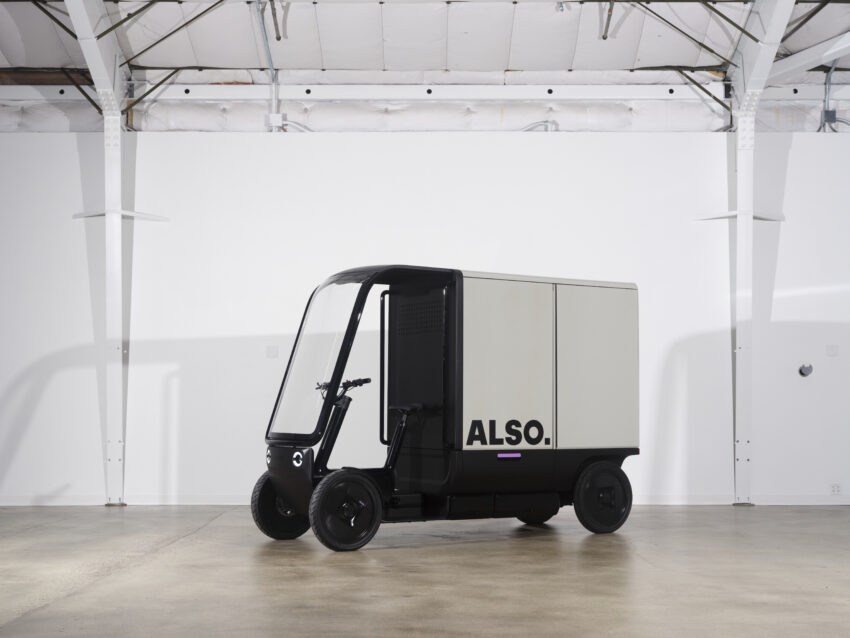
amazon wants to buy thousands of rivian Amazon is set to enhance its delivery capabilities by collaborating with Rivian’s Also spinoff to acquire thousands of custom-designed pedal-assist cargo bikes.
amazon wants to buy thousands of rivian
Amazon and Rivian: A Renewed Partnership
The collaboration between Amazon and Rivian marks a significant development in their ongoing relationship, which has evolved over the years. Initially, Rivian was known for its electric delivery vans, specifically designed for Amazon. The two companies worked closely to develop the EDV (Electric Delivery Vehicle), which became a cornerstone of Amazon’s logistics strategy. This new venture into pedal-assist cargo bikes signifies a shift towards micromobility solutions, which are increasingly being recognized as essential for urban logistics.
The TM-Q Quad Bike
The pedal-assisted cargo bike that Amazon plans to utilize is likely based on the TM-Q quad vehicle, recently unveiled by Also in San Francisco. This innovative design aims to address the challenges of urban delivery by providing a versatile and efficient means of transporting goods. The TM-Q quad is designed to navigate congested city streets, making it an ideal solution for last-mile delivery.
One of the standout features of the TM-Q quad is its pedal-by-wire technology, which enhances the riding experience and allows for smoother operation. Additionally, the bike includes a removable battery that doubles as a mobile power bank, providing added convenience for delivery personnel. This focus on user-friendly design aligns with Amazon’s goal of improving delivery efficiency while minimizing environmental impact.
Expanding the Fleet of Micromobility Vehicles
Amazon’s ambition to deploy “thousands of quads” across Europe and the United States reflects a broader trend in the logistics industry towards micromobility solutions. These vehicles are particularly well-suited for urban environments where traditional delivery trucks may struggle due to traffic congestion and limited curb space. By integrating pedal-assist cargo bikes into its fleet, Amazon aims to enhance its delivery capabilities while reducing its carbon footprint.
Emily Barber, Director of Amazon’s Global Fleet, emphasized the importance of micromobility solutions in a recent statement. “Micromobility solutions like pedal-assist e-cargo quads allow us to quickly deliver to customers in dense, urban cities, while helping reduce traffic and noise,” she said. This statement underscores Amazon’s commitment to sustainability and innovation in its logistics operations.
The Evolution of Urban Delivery
The rise of e-commerce has transformed urban delivery logistics, leading to increased demand for efficient and sustainable delivery methods. As cities become more congested, traditional delivery vehicles face challenges that can hinder timely deliveries. The integration of electric cargo bikes into Amazon’s delivery fleet represents a proactive approach to addressing these challenges.
Benefits of Pedal-Assist Cargo Bikes
Pedal-assist cargo bikes offer several advantages over traditional delivery vehicles:
- Environmental Impact: Electric cargo bikes produce zero emissions, making them a more sustainable option for urban deliveries. This aligns with Amazon’s broader sustainability goals, which include a commitment to reach net-zero carbon by 2040.
- Cost Efficiency: Operating electric cargo bikes can be more cost-effective than traditional delivery vans, especially in densely populated areas where fuel and parking costs can add up.
- Agility and Flexibility: Cargo bikes can navigate narrow streets and congested areas more easily than larger vehicles, allowing for quicker deliveries and improved customer satisfaction.
- Noise Reduction: Electric bikes operate quietly, contributing to a reduction in noise pollution in urban environments.
Stakeholder Reactions
The announcement of this partnership has garnered attention from various stakeholders in the logistics and transportation sectors. Industry experts have praised Amazon’s move towards micromobility solutions, viewing it as a forward-thinking approach to urban logistics. The collaboration with Rivian’s Also spinoff is seen as a strategic decision that leverages advanced technology to enhance delivery efficiency.
Environmental advocates have also welcomed the initiative, highlighting the potential for reduced emissions and improved air quality in urban areas. As cities grapple with the challenges of climate change and urbanization, solutions like pedal-assist cargo bikes are increasingly viewed as essential components of sustainable urban planning.
Challenges Ahead
While the partnership between Amazon and Rivian presents numerous opportunities, it is not without its challenges. The successful implementation of pedal-assist cargo bikes in urban environments will require careful planning and consideration of various factors:
Infrastructure Considerations
For pedal-assist cargo bikes to be effective, cities must invest in the necessary infrastructure, including dedicated bike lanes and secure parking facilities. Without adequate infrastructure, the potential benefits of these vehicles may be diminished. Amazon’s success in deploying these bikes will depend on collaboration with local governments and urban planners to create a supportive environment for micromobility solutions.
Regulatory Challenges
As with any new transportation technology, regulatory hurdles may arise. Local governments may need to establish new regulations governing the use of electric cargo bikes, including safety standards and operational guidelines. Navigating these regulatory landscapes will be crucial for Amazon as it seeks to expand its fleet of pedal-assist cargo bikes.
Public Perception
Public acceptance of electric cargo bikes is another factor that could influence the success of this initiative. While many consumers may appreciate the environmental benefits and efficiency of these vehicles, others may have concerns about safety and the impact on traffic. Amazon will need to engage with communities to address any concerns and promote the advantages of micromobility solutions.
The Future of Delivery Logistics
The collaboration between Amazon and Rivian’s Also spinoff represents a significant step towards the future of delivery logistics. As urban areas continue to grow and evolve, the demand for innovative and sustainable delivery solutions will only increase. By investing in pedal-assist cargo bikes, Amazon is positioning itself at the forefront of this transformation.
As the e-commerce giant expands its fleet of micromobility vehicles, it will likely continue to explore new technologies and partnerships that enhance its delivery capabilities. The integration of electric cargo bikes into Amazon’s logistics strategy not only demonstrates a commitment to sustainability but also reflects a broader shift in the industry towards more efficient and environmentally friendly delivery methods.
In conclusion, the partnership between Amazon and Rivian’s Also spinoff to deploy pedal-assist cargo bikes is a notable development in the realm of urban logistics. As cities face increasing challenges related to congestion and environmental sustainability, solutions like these bikes may play a crucial role in shaping the future of delivery. The success of this initiative will depend on various factors, including infrastructure development, regulatory considerations, and public acceptance. However, the potential benefits of integrating micromobility solutions into urban delivery logistics are significant, paving the way for a more sustainable and efficient future.
Source: Original report
Was this helpful?
Last Modified: October 23, 2025 at 2:38 am
2 views















